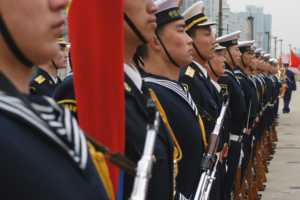World heading toward “permanent cyber war”: France’s cyber chief.
The world is heading towards a “permanent war” in cyberspace, Guillaume Poupard, director general of the National Cybersecurity Agency of France (ANSSI), has warned. Poupard said cyberattacks of growing frequency and intensity were coming from states which he did not name, as well as criminal and extremist groups. “We must work collectively, not just with two or three Western countries, but on a global scale,” he added, saying attacks could aim at espionage, fraud, sabotage, or destruction.
The world is heading towards a “permanent war” in cyberspace, Guillaume Poupard, director general of the National Cybersecurity Agency of France (ANSSI), has warned.
Poupard said cyberattacks of growing frequency and intensity were coming from states which he did not name, as well as criminal and extremist groups.
“We must work collectively, not just with two or three Western countries, but on a global scale,” he added, saying attacks could aim at espionage, fraud, sabotage, or destruction.
“We are getting closer, clearly, to a state of war – a state of war that could be more complicated, probably, than those we’ve known until now.”
He was speaking against the backdrop of the WannaCry ransomware attack, which infected more than 230,000 computers in 150 countries in one day, and news of Russian government hackers’ efforts to influence elections in several countries, including the United States, France, and Germany.
President Vladimir Putin on Thursday admitted that “patriotically minded” Russian hackers may have been behind the hacking of the Democratic National Committee (DNC) and the Clinton campaign, but denied “state level” involvement (Putin: “‘Patriotic,’ ‘private’ Russian hackers may have interfered in 2016 U.S. election,” HSNW, 1 June 2017).
In France, campaign laws forbid candidates and parties from issue election-related statements in the forty-eight hours before voting begins, and there are also strict journalistic reporting limits during this time period. Hackers who broke into the computer systems of En Marche!, President Emanuel Macron’s party, stole a large amount of emails and internal documents – then posted them on social networks a short time before the 48-hour deadline kicked in before the second round of the presidential election, making it impossible for the Macron and his campaign to respond.
Vitali Kremez, director of research with US-based cyber intelligence firm Flashpoint, told the Independent that his team’s analysis indicated that APT 28, also known as Fancy Bear or Sofacy, a group tied to Russia’s GRU military intelligence directorate, was behind the attack.
Poupard, though, described the Macron campaign hack as “not very technological“ and said “the attack was so generic and simple that it could have been practically anyone.”
Putin openly supported Macron’s rival, National Front’s leader Marine Le Pen, and the conclusion that it was Russian government hackers who were behind the attack on the Macron campaign was based not only on digital fingerprints, but also on the modus operandi.
En Marche! party confirmed it had “been the victim of a massive and coordinated hack” that had “given rise to the diffusion on social media of various internal information.”
A party’s spokesperson said the communications only showed the normal functioning of a presidential campaign, but that authentic documents had been mixed on social media with fakes and doctored ones to sow “doubt and misinformation.”
Ben Nimmo, of the Atlantic Council’s Digital Forensic Research Lab, told the Independent that far-right American activists were likely behind early efforts to spread the documents on social media, before they were picked up by Le Pen’s supporters in France.
He said that the contents appeared to be “99 per cent boring,” but the En Marche! leaks and other conspiracy theories targeting Macron had exposed a “real confluence of interest” between Russia and the far right in Russia and France.
“They’re not necessarily coordinated, but they’re interested in a lot of the same stuff,” Nimmo added.
There have been repeated allegations of Russian interference in elections across Europe and the United States, and Macron previously targeted Russian state media like RT and Sputnik for spreading “fake news” to damage his campaign.
In a meeting earlier this week in Versailles, Macron raised the issue directly with Putin, saying in a joint news conference “Russia Today [RT] and Sputnik were agents of influence which on several occasions spread fake news about me personally and my campaign.”
“They behaved like organs of influence, of propaganda and of lying propaganda,” Macron added.
Journalists from these two Russian outlets were barred from his campaign headquarters, and their credentials to attend press conferences at the Élysée Palace.
Read the original story at Homeland Security Newswire.




